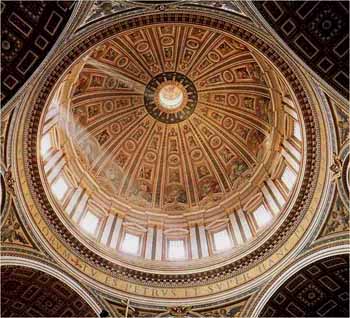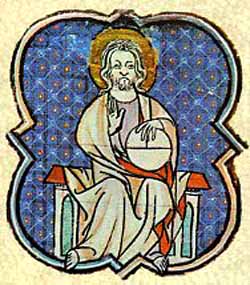 |
Catholic Virtues
Wisdom: the Queen of Virtues
Plinio Corrêa de Oliveira
One of the characteristics of Holy Mother Church is to inspire wisdom, the virtue that encompasses all the others. We can then ask: What are the defining points of this virtue?
Wisdom, truth and goodness

Wisdom is a virtue that encompasses all the others |
Regarding truth, wisdom is the virtue that leads a man to seek the highest truth. Regarding goodness, it makes man love the most splendid good.
Further, wisdom prepares man to seek the whole edifice of truth and goodness and to discover the similarities and differences between them. Once he understands those differences and harmonies, he can have a picture of the whole that encompasses all truth and goodness.
This wise ensemble is an architectonic view, that is, it assimilates all the other individual truths and goodnesses just as the architecture of a cathedral encompasses all the elements under its roof – the altars, statues, stain glass windows, sacred vessels, etc. Thus wisdom encompasses all other truths and virtues.
Wisdom and the theological virtues
Wisdom prepares man to fully correspond to the Faith. When a man has wisdom, he wants to know the whole Faith, from the highest and most mysterious aspects of the Faith to the simplest ones.
With regard to Hope, wisdom encourages man to seek out the highest good for himself and for others – the diverse forms of sanctity that exist in the Church. He can even imagine forms of sanctity that could have existed if this person, family, religious order or nation would have corresponded to grace in this or that historical situation. Desiring every possible form of glory for God is the normal object of hope for the person who has this form of wisdom. Needless to say, the particular type of sanctity that he was specially called to achieve is the object of his wise hope.
With regard to Charity, wisdom pushes man to the most zealous and extreme dedication, one that tends toward a voluntary, disinterested holocaust of himself. It moves him to the most ardent fight for the good, to the full conviction that the truths of Catholic Faith and the norms of Catholic Morals must be put into practice.
Therefore, we can say that wisdom dwells in the virtues of Faith, Hope and Charity, harmonizing them and bringing them to their very apex.
Wisdom’s influence on temperament

Wisdom contemplates the whole of Creation |
In relation to the temperament, wisdom gives temperance. It represents the tendency of the person to have a completely balanced mind and spirit. Wisdom has an enormous facility to adapt a man’s temperament to carry out what the intelligence tells the will to accomplish. The wise man has no proclivity to become upset, bitter or lazy.
In this calm state of mind, wisdom inspires the extreme of combativeness or of tenderness, depending on the circumstances. It moves a person toward the most elevated contemplation or the most enterprising action. Inspired by wisdom, the human temperament is ready and willing to assume either of these apparently contradictory attitudes. Certainly, human wisdom is hampered by the lacunas of original sin; nonetheless, it ends by forming a temperament disposed to undertake anything in accordance with its counsel.
Wisdom signifies a will and temperament that is flexible, strong and easily moved to the furthest extremes. Having this virtue, a man can practice virtues that seem diametrically opposed because, in reality, they are not contradictory but in harmonic opposition.
The harmonic contraries in the Church
The Church is an unparalleled example of the harmonic contraries. She nurtures warriors, but also Sisters of Charity who care for the sick and wounded - be they Catholics or enemies. The extreme of bellicosity and the extreme of goodness are born from the same bosom of the Church.
She raises hermits to live in an absolute silence, continuously meditating on the truths of God, but she also raises up laymen in the world to make an incessant fight to change and form temporal society according to her principles.
She inspires all the splendor and luxury of the Vatican, but at the same time she kindles religious orders like the Capuchins, who live in extreme poverty, begging for everything they need.
Let us point out that in these oppositions there is no contradiction. Quite the reverse, there is harmony. It is characteristic of the spirit of the Church to soar in magnificent flights toward all these extremes. One would say that the multiform extremism of the Church gives birth to the vision of her complete and perfect sanctity.
Two notes, therefore, are present in this wise vision. On the one hand the spirit of the Church inspires a multitude of completely opposite virtues and actions; on the other hand, her spirit is vast, rich, without any unilateralism, obsession or attachment.
She demands of each one of her children that he recognize these seemingly opposed virtues and realize that he is but a single ray of this sun. The sun in its totality shines much more brilliantly than any of its rays. This is the spirit of the Church. It exists in the totality of her many different aspects.
As a consequence, the Catholic spirit appears as both very rigid and very nuanced. It is rigid in that it tends toward the extreme; it is nuanced in that it is expressed by an immense gamut of rays that shoot out in all directions. At the same time, this rigidity and flexibility – guided by Catholic wisdom – are harmonic.
The Catholic spirit, therefore, loves both unity and variety. It loves the categorical, the intransigent and the extreme affirmations of truth and goodness. But it also loves the nuances that make those affirmations comprehensible and balanced.
Thus the Catholic spirit is capable of adjusting and adapting to circumstances even while it is iron clad in its principles. It categorically rejects every type of evil. It accepts the good in all its forms; it rejects the evil in any of its expressions. With regard to evil, it refuses all compromises. Therefore, it has an iron inflexibility and, simultaneously, an agile adaptability.
These are the characteristics of the Catholic spirit when it is imbued with the virtue of wisdom.

This lecture delivered in 1965 was translated from the
transcript of a tape and adapted by A.S. Guimarães
Posted March 15, 2010

Related Topics of Interest
 First Principles on Purity First Principles on Purity
 The Military Virtues Every Catholic Must Have The Military Virtues Every Catholic Must Have
 Defining the ‘Left’ and the ‘Right’ Defining the ‘Left’ and the ‘Right’
 Our Lady Sedes Sapientiae Our Lady Sedes Sapientiae
 The Material Man vs. the Spiritual Man The Material Man vs. the Spiritual Man
 Revolution and Counter-Revolution - Overview Revolution and Counter-Revolution - Overview
 The Fidelity of the Remnant throughout History The Fidelity of the Remnant throughout History

Related Works of Interest
|
|
Catholic Virtues | Religious | Home | Books | CDs | Search | Contact Us | Donate

© 2002- Tradition in Action, Inc. All Rights Reserved
|
 |
|